The central character in Kevin Kearney's "Freelance" is Simon: a 19-year-old who has just graduated from high school and is the son of two hardworking, appropriately concerned parents in Philadelphia. He's trying to strike out on his own — partly to prove everyone wrong. Simon drives for HYPR, a fictional rideshare app, to cover the low rent in a mouse-infested apartment.
Small Press Nite, Vol. 10
7 p.m. Saturday, May 31
The Book Catapult, 3010-B Juniper St., South Park
Free
He faces skepticism from all sides — doubts about his future and disdain from peers critical of the gig economy's impact on workers. But Simon is making an actual living, as HYPR starts to get a little too intertwined with his every move.
"His plan is to work for this rideshare app that is a monopoly and is kind of shadowy. But he ignores all of that because he thinks that this is his ticket to success. And as the book continues, the app starts offering him these incentives, these rewards, these secrets, and Simon starts to grow enchanted with the app, which has sort of all of these, uh, consequences," Kearney said.
Kearney has a knack for effortless, tension-packed prose and absurd-yet-tender storytelling. He weaves together a handful of converging (and diverging) characters, and however terrifying their circumstances may be, it's always a delight to glimpse inside their minds.
While San Diegans may know Kearney for his scrappy but popular literary reading series, Small Press Nite, many have never heard him read his own work. For the first time in the regular series' two-year history, Kearney is in the actual lineup.
Small Press Nite Vol. 10 marks the end of an era for Kearney, who is leaving San Diego to travel — though the series will continue with local writers KKUURRTT and Eddie Matthews at the helm.
Interview highlights
On rideshares and passengers
I was always fascinated, just narratively, by a story about a rideshare driver, because I thought it offered this incredible opportunity — where you can have an interesting character who then is forced to interact with whoever ends up in their back seat. So, as a writer, that's kind of a gift, because it's this formula that you can repeat and have all of these interesting outcomes over and over again.
And as I started reading about what it's actually like to be a rideshare driver, talked to some people who were rideshare drivers, I started learning about what it's actually like to work in that job, what it's like being under the surveillance of an app at all times and being, I guess, subject to the whims of random software updates. I tried to anchor it in the reality of what, maybe, it's like working for our currently existing rideshare apps. And then I also took a lot of liberties in making this its own company and its own software.
On ideas of prestige and success
Simon is invited to this program, the Gifted Young Drivers Academy, which is sort of like a VIP version of the job that no one else can find any information about. It's seemingly just been presented to him. And it offers a lot more money. It offers some prestige, at least in Simon's eyes, but it also requires a lot of things of him: more work, consistent work, and a lot of things that Simon doesn't even quite understand when he signs up for them.
And so I started thinking about my own history working, the way that I've defined myself often by the work that I've done and the struggle to sort of detach myself from that and allow myself to define my identity outside of any sort of paycheck that I'm receiving.
I think I'm actually just writing about what it means to work.Kevin Kearney
When I started this book, I had just moved to California from Philadelphia, and I had just left teaching. I had taught high school for 10 years at that point. I thought that I was working on this book about a rideshare driver, and the more I started writing about Simon's job and what it's like to work in this particular context, I started realizing that, oh, I'm actually writing about teaching. I'm writing about my experience in the classroom. And the more that I dug into that, then I eventually realized, oh, I think I'm actually just writing about what it means to work — for a lot of people — and what it means to perform as someone on the job in that role that doesn't necessarily align with the way that you view yourself off the clock or outside of that very particular role.
On convenience and surveillance
I think all of us have to — maybe not have to, but maybe should — interrogate the conveniences that we use every single day and what exactly we're sacrificing for that. And I'm not suggesting that a Luddite revolution is in order, but I think we should at least be aware of what exactly we're giving up for all of the conveniences that a smartphone allows for. And I think for the most part, we've kind of just accepted that these things are inevitable and that they're completely unstoppable. And I don't think that that's necessarily true, but I think that's a very easy thought to fall into.
On 'page-turners'
The term page-turner I think is often seen as kind of cheap, like even the word pulp implies that it's just paper. But I really like stories that keep you turning the page, that at the end of the chapter you feel like, "I can't put it down just yet, I need to move on to the next one."
So that's something I really value as a reader, and I think that I've really tried to bring that into my writing. I think just simple questions of “whodunit” or knowing that there's some sort of terror lurking behind the corner — I find that really intriguing as a reader. And so I think as a writer, I'm constantly thinking of that reader who could turn their attention away from this at any given second. There are an infinite number of things that they could be focusing on and that are just absolutely vying for their attention. I'm constantly thinking about that as I'm writing and I'm trying to make sure that I am pulling them along and getting them through the book. Personally, I find that really satisfying.
The reader also plays a role in constructing what it actually means, what inevitably happens, and what that means for the life of these characters beyond that last page.Kevin Kearney
On mysterious (some might say vague) endings
Clearly, I love them. I think that as a reader and as a writer, I really appreciate stories that make space for the reader. I like that it's a world that has been created by a writer, but then the reader also plays a role in constructing what it actually means, what inevitably happens, and what that means for the life of these characters beyond that last page.
On building a reading series
I had moved here in August of 2022 and didn't really know a lot of people — and especially didn't know a lot of people in the writing world here. But I started meeting some writers and I started regularly kind of just meeting up casually and I was asking, "Is there a reading series? Is there kind of like a scene?" And no one had an absolute answer for me. Everyone said, "I think something used to exist. I remember going to readings a couple years ago."
So I knew that there was this opportunity — because it seemed like there was a vacancy and yet it seemed like people were interested in this and that people were looking for something to gravitate towards.
I came up in a very prolific music scene. I was constantly putting out records, booking shows, playing in bands. So I figured I'll just take all the lessons from that and I'll apply that to this. I reached out to a number of bookstores. Seth at the Book Catapult was the only one who got back to me and he said, "Absolutely. This sounds awesome. Go for it. Do whatever you want." The first event was a success and people seemed really excited to kind of have this meeting ground. So then we booked another one, and then it just kind of took off from there.
Kevin Kearney's 'Freelance' Reading List
- "Neuromancer" by William Gibson
- "2001: A Space Odyssey" by Arthur C. Clarke
- "The Big Sleep" by Raymond Chandler
- "The High Window" by Raymond Chandler
On what small presses can offer a community
I think for one, it's going to be something that is very contemporary. It's people who are actively writing, actively publishing. It's also intentionally things that are largely avoided by mainstream literary culture. It's not things you will find in your newspaper's weekend book review. It's not things that are going to be on a bestseller list — and I think that that's the really interesting thing. These are off the beaten path, and they're experimental — and they're doing things that, 10 years from now, mainstream publishing will catch up to.






